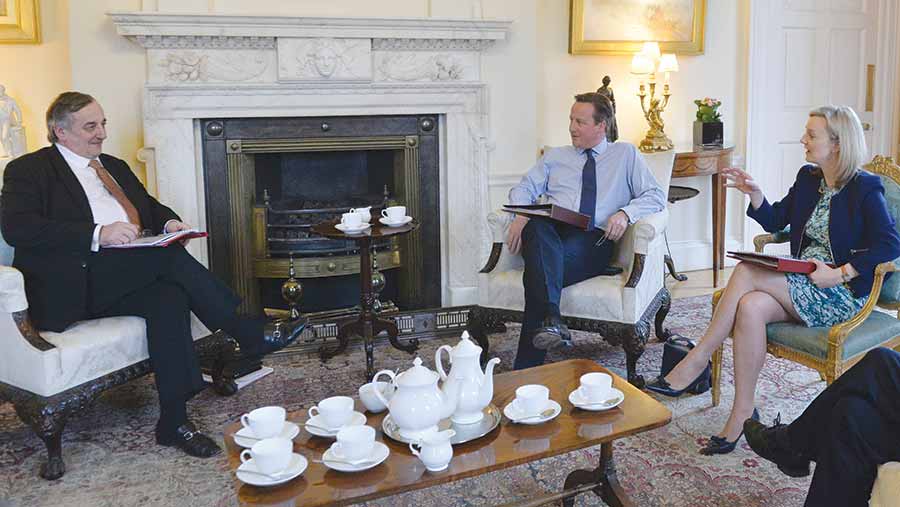NFU seeks urgent talks to restructure farm debt
 Meurig Raymond (left), David Cameron and Liz Truss meet at 10 Downing Street.
Meurig Raymond (left), David Cameron and Liz Truss meet at 10 Downing Street. Industry leaders are seeking urgent talks with government ministers and agricultural lenders to discuss ways of helping cash-strapped producers by restructuring farm debt into longer-term loans.
NFU president Meurig Raymond pressed home the need to ease the pain faced by thousands of family farmers during a Downing Street meeting with prime minister David Cameron and Defra secretary Liz Truss on Tuesday (15 March).
Speaking afterwards, Mr Raymond said a high-powered meeting promised by Ms Truss between the NFU, Defra, the Treasury, high street bank lenders and the European Investment Bank (EIB) should take place as soon as possible.
“I realise EIB funding is meant to be about investing in the future, but there are many farmers out there – especially ambitious younger farmers – who have invested heavily in their business during the past three or four years and now find they cannot make a profit,” said Mr Raymond.
Allowing farmers to repay debt when commodity prices had recovered would give producers some hope for the future, suggested Mr Raymond. But he cautioned: “At the moment, we don’t know the small print – we don’t know what is possible.”
High borrowings
UK farm businesses borrowed a record £17.1bn last year – a year-on-year increase of 8.4% and the fourth year in a row that borrowing has risen by more than 7%. Earlier this year, land agent Savills said 30% of farmers selling up were citing debt as the reason.
Ms Truss won support from other European farm ministers when she called for measures to help farmers access finance during an earlier EU agriculture council meeting. Brussels has now agreed to prioritise engagement with the EIB to develop special financial tools for agriculture.
It is unclear how long that will take – and Mr Raymond himself has admitted it is unlikely to offer a short-term fix. But he said the prime minister appeared keen to help agriculture and understood the challenges faced by the industry.
Charm offensive
With less than 100 days to go before the UK in-out referendum on EU membership, Mr Cameron has been keen to show his agricultural credentials when meeting farmers during visits to north Wales and East Anglia.
Ramping up his efforts to persuade farmers they are better off in the EU rather than out, the prime minister said livestock producers would be forced to pay an extra £330m/year to export their goods abroad in the event of an EU exit.
“British farmers and food producers rely on the single market,” said Mr Cameron. “It gives them access to 500 million consumers, to whom they can sell their goods on an open, unrestricted basis. No tariffs, no barriers and no bogus health-and-safety rules designed to keep our products out.”
